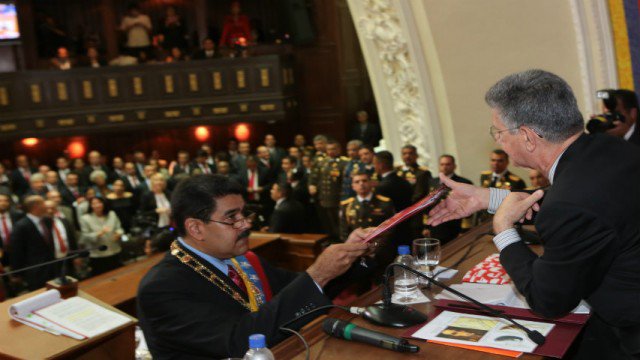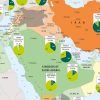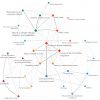
Initially, Hugo Chávez won elections, all above board. But then he began to win with all manner of chicanery and by manipulating the State’s institutions, as his regime gradually jettisoned any checks and balances. Nevertheless, he continued to win incontestably. Now, under Nicolás Maduro, whose mandate ends in 2019, chavismo has at last begun to clearly lose. For the first time in 17 years the opposition has decisively triumphed in legislative elections, gaining two-thirds of the seats in the National Assembly last 6 December. So far the result has been a clash between the Legislative and Executive powers, with the latter also controlling the Judiciary. Chavismo, which has always been a sore loser, as noted by The Economist, is down but not out, and still has a lot of tricks up its sleeves.
The Supreme Court, under chavista control, has suspended three deputies on the basis of allegations of electoral fraud, and the Chamber –a ‘bourgeois assembly’ according to Maduro– has had to give in, thus denying the opposition a supermajority in the House that would provide it with ample elbow room against an Executive intent on annulling the Assembly for contempt. Some jurists want to revoke the appointment of the High Court’s judges. But without a two-thirds majority the Assembly can neither declare amnesties nor call for a revocatory referendum –a process heretofore much-favoured by chavistas– against Maduro. The institutional stand-off might endure for some time and who knows what the outcome will be.
Despite its victory, the opposition remains a highly diverse grouping and therein lies its weakness, with 18 parties comprising the Mesa de la Unidad Democrática (the aptly-named MUD), with no clear leader standing out. Henrique Capriles, who narrowly lost the 2013 presidential, Leopoldo López and Antonio Ledezma, the mayor of Caracas, are all in gaol. But one of them is likely to be the leader who will take on chavismo without Chávez.
Following a failed coup in 1992, Chávez won the elections on the back of the previous regime’s social inequality and corruption. His rule certainly helped out and supported many people. But, in turn, it generated its own highly corrupt mechanisms. Among other things, the regime pays its minions with US dollars at 11 bolivars, which are then re-sold at 850. According to Venezuelans commentators, US$100 can become 85,000 bolivars, while most people live on no more than 9,000 bolivars a month. And prices are continuing to surge amidst a growing shortage of basic necessities, including medicines, and of an inflation rate that, according to the IMF, has not fallen below 100% in 2015 and could even double this year.
According to some analysts, the hydrocarbon-rich State is on the brink of defaulting on its foreign debt and the economy could shrink by 15% between 2015 and 2016. The government has announced that the country is under ‘economic emergency’ –a de facto state of emergency–, allowing it to govern by decree for 60 days, renewable, although parliamentary ratification will be necessary, thereby requiring some form of negotiation and horse-trading. As the former Spanish socialist Prime Minister Felipe González has said, ‘Venezuela is the kingdom of arbitrary rule and President Maduro is leading the country to destruction’. The President, in his speech on the state of the nation at the National Assembly, described 2015 as a ‘disastrous’ year. Everything has deteriorated under Maduro who, sinking to further depths, has appointed Luis Salas his new Vice President for Economic Affairs. Salas has in the past made highly extravagant claims, such as affirming that ‘the economic war is fought by waging war from the government’ and that ‘inflation is the economic counterpart of political fascism. One of the first conclusions that can be drawn from this is that it makes little sense to continue talking about “inflation and shortages” when what we are talking about is speculation, usury and hoarding’.
Despite its oil wealth, neither Chavez nor Maduro have invested in the country’s future. They have spent money on subsidies to the poorest, certainly, but also to political cronies. But that will not be possible in the future, since their economic policy has led to mayhem. The oil sector, lacking investment and poorly managed following the political take-over of Petróleos de Venezuela, is in free fall. Declining oil prices have been a blow, while shortages, queues and inexistent public safety are all playing against the regime.
Since well before the latest elections there has been an ongoing clash between the opposition and the regime. For the time being the struggle has been restricted to the institutional sphere, to a wrestling match between the various powers of the State. The Executive has hastily changed the rules governing the Bank of Venezuela. The historian Rafael Arráiz Lucca has written lucidly that ‘all derogatory comments about chavismo are based on the past’ at a time when people are starting to look to the future to a certain re-institutionalisation of the country. For it is by looking forwards, and that includes the opposition, that this country will overcome its political and economic stagnation. Removing the portraits of Bolívar and Chavez from parliament on the orders of its new President is also part of the farce’.
One problem, as suggested by a report by Barclays and other independent observers, is that in the current circumstances there are neither mediators nor independent referees to manage the conflict between powers. Although the Spanish government is attempting to push forward the EU as a mediator, the prospects of engaging in an effective dialogue either domestically or internationally are pretty dim. Perhaps there will appear a mediator amongst the weakened allies of the Bolivarian axis? Such a thing would be difficult, but not impossible. Or perhaps the mediator could be Luis Almagro, Secretary General of the Organisation of American States (OAS), who in a letter to Maduro warned him that the Interamerican Democratic Charter ‘requires action’ when ‘in a Member State situations arise that can affect the normal development of the democratic institutional process’.
However, without a mediator it might be the army that will be the arbitrator, despite being unwilling to either spill blood or to lose its prerogatives. As well as defence, internal security and intelligence, the military have substantial economic power. Middle-ranking officers, as noted by Antonio Maria Delgado in El Nuevo Herald and as shared by most of society, are becoming increasingly frustrated with the situation. The Defence Minister, Vladimir Padrino López, has stated firmly that the Constitution will be respected. And indeed the military have halted in their tracks both Diosdado Cabello, the former all-powerful chairman of the National Assembly, and his allies in the new Cabinet. Chavismo is becoming riven with dissent in response to what seems the advent of a period of change.
Hegel noted that all great events and personalities in world history appear twice, but Marx added that ‘once as tragedy, the second as farce’. Chavez, like it or not, was a politician. Maduro is his farcical mirror image, but firmly ensconced in a web of vested interests that would make anyone reluctant to step down. Venezuela is moving into a period of transition, but the question is how, who with and whence. The answers are anybody’s guess. Nevertheless, change is most certainly in the offing.


